Doubly sweet
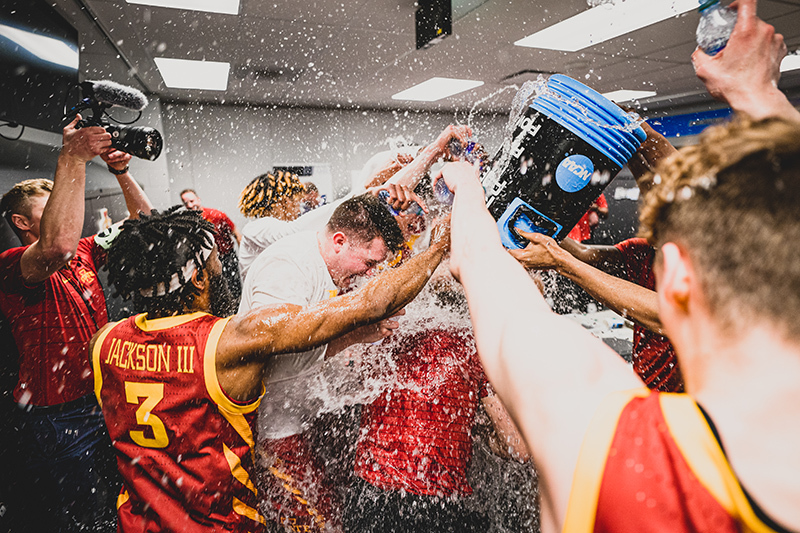
Celebrating an upset win over Wisconsin March 20, members of the men's basketball team douse head coach T.J. Otzelberger (red shirt, center) in a joyous Cyclone locker room. Photo courtesy of Athletics Communications.
Following an unpredictable first weekend of NCAA basketball national tournament play, Iowa State's men's and women's squads advanced to the round of 16 on March 25. The feat is not a first for the university; both teams also made the Sweet 16 in 2000, when the men advanced to the Elite Eight. It is the sixth NCAA Sweet 16 achievement for both programs. But as women's head coach Bill Fennelly noted in post-game interviews March 20, the accomplishment never gets old.
"This is a unique place with unique people. Anytime Iowa State is on a national stage like this, in the biggest sporting event in the world, in my mind, and both teams are doing what they're doing, that's advertising that would be really expensive to buy, I would guess," Fennelly said. "It's a tribute to how our school runs its [athletics] department and all its sports. There are limitations we have here, but we don't have any limitation in people and in purpose. It's a proud moment for all of us."
Pep band stands in for the Blue Demons
Cyclone pep band members donned an unfamiliar color and quickly learned a new fight song to serve as DePaul's tournament band for the March 16 NCAA women's play-in game at Hilton Coliseum.
President Wendy Wintersteen agreed.
"Cyclone Nation could not be prouder of our men's and women's basketball teams," she said. "Coach Fennelly and his team are setting new records with every game, and Coach [T.J.] Otzelberger and his team have exceeded all expectations for this season, showing us the athletics version of 'Innovate at Iowa State.'"
A weather event?
The success of the men's team is an undeniable surprise in the first year of Otzelberger's tenure as head coach. The men were 2-22 last season. The goal for this year, Otzelberger said after the victory over Wisconsin in the round of 32, was to establish the right work habits and restore pride to the program. As a former assistant under three Cyclone head coaches spanning eight years and the husband of three-time All-Big 12 Cyclone basketball star Alison Lacey, he's keenly aware of the historical significance of the season.
"I'm really happy for everybody. I'm happy for our alums, our former players, these young men -- it's just a team win across the board. It's a surreal feeling," he said.
Hang on to your hat if you're heading to Chicago Friday (8:45 p.m. tipoff, TBS), where the Cyclone men will take on the Hurricanes from the University of Miami, the No. 10 seed in the Midwest regional led by a super senior named McGusty. It's a matchup "just as Mother Nature planned it," according to one post earlier this week. Iowa State is the region's No. 11 seed.
Worn-out weather jokes aside, the Cyclones and Hurricanes have earned the other's respect. Between the two squads, they knocked out the No. 2, 3, 6 and 7 seeds to earn their spots in the Sweet 16.
Sweet Carolin-a
The Cyclone women, seeded No. 3 in their region, head to Greensboro, North Carolina, Friday night to play the Creighton Bluejays (8:30 p.m. tipoff CST, ESPN2), who upset the second-seeded Iowa Hawkeyes to qualify for the Sweet 16. The other two teams at the regional are North Carolina and South Carolina, which spent the entire season atop the Associated Press national women's poll.
So, lectures program director Amanda Knief accepts she may be outnumbered by fans with "Carolina" on their T-shirts, but she's traveling and undaunted. Knief's freshman year at Iowa State (1995-96) also was Fennelly's first year as head coach, and she rarely missed a home game during her student years. She's a loyal season ticket holder these days (row four in section 130) and calls this year's team "a joy to watch.
"The heart they show, the way they support each other, in any game any player can shine," she said.
Her chance to cheer for them another weekend "is providence." A planned trip to visit a friend in Raleigh suddenly dovetailed with Cyclone basketball when the tournament assignments were announced March 13. So, the friends will be spending less time in Raleigh -- and Knief can't wait.
"I love sharing this team with people. They play with so much class and integrity," she said.
Student athletes
Success on the court isn't the only way these Cyclone teams will be remembered. The men's team recorded the highest team GPA on record for the program, and the women's team placed seven members on the women's basketball Academic All-Big 12 Conference Team, said Tim Day, University Professor of molecular pharmacology and Faculty Athletics Representatives Association president.
"Making it to the Sweet 16 aligns with the academic success of those programs. Coach Otzelberger and Coach Fennelly really want their players to be as good as they can be at everything they do," Day said. "They see academic and athletic success complimenting each other, not in competition with each other.
"Both teams have really bought into the value of daily discipline and working for each other," he added.
A triple double
With 351 universities sponsoring men's and women's Division 1 basketball, incredibly Iowa State is one of three universities -- joining North Carolina and Michigan -- to have both of its teams reach the second week of the tournament.
"Not very many Cyclones fans could in good conscience say they have had any disappointment with how things have gone," said Dr. Bill Hoefle, professor of veterinary clinical sciences and a season-ticket holder for both teams, dating back 52 years for the men (row three in section 132).
Perhaps the only disappointment has been the tournament scheduling. In the first two rounds, the men and women essentially played back-to-back. On Friday, the time slots for their games overlap almost entirely.
If the schedule allowed, Hoefle would have been figuring out how to shuttle between Chicago and Greensboro to catch both games. Instead, he'll be at the United Center to watch the men, cheering for an outcome similar to what he was on hand to enjoy in Milwaukee last weekend.
"I'm just grateful for this season we're having," he said.
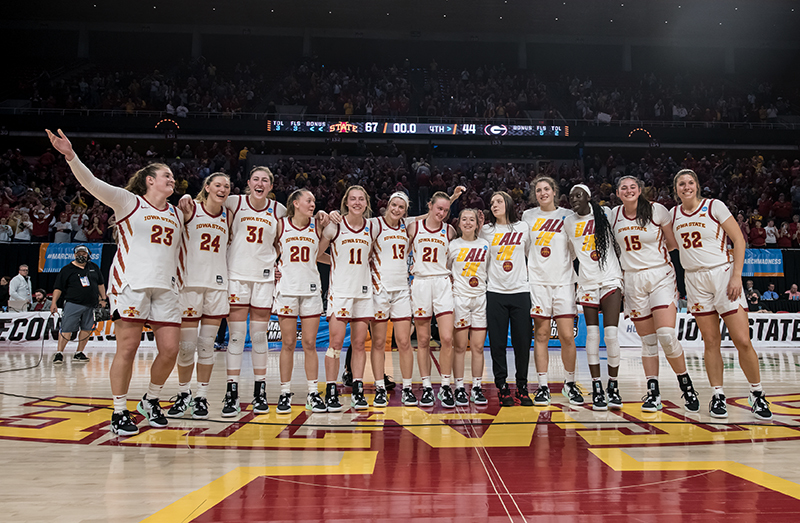
Following their final Hilton Coliseum victory of the season March 20, members of the Iowa State women's team acknowledges loyal Cyclone fans. Photo courtesy of Athletics Communications.
Pep band saves day in stand-in stint for Blue Demons
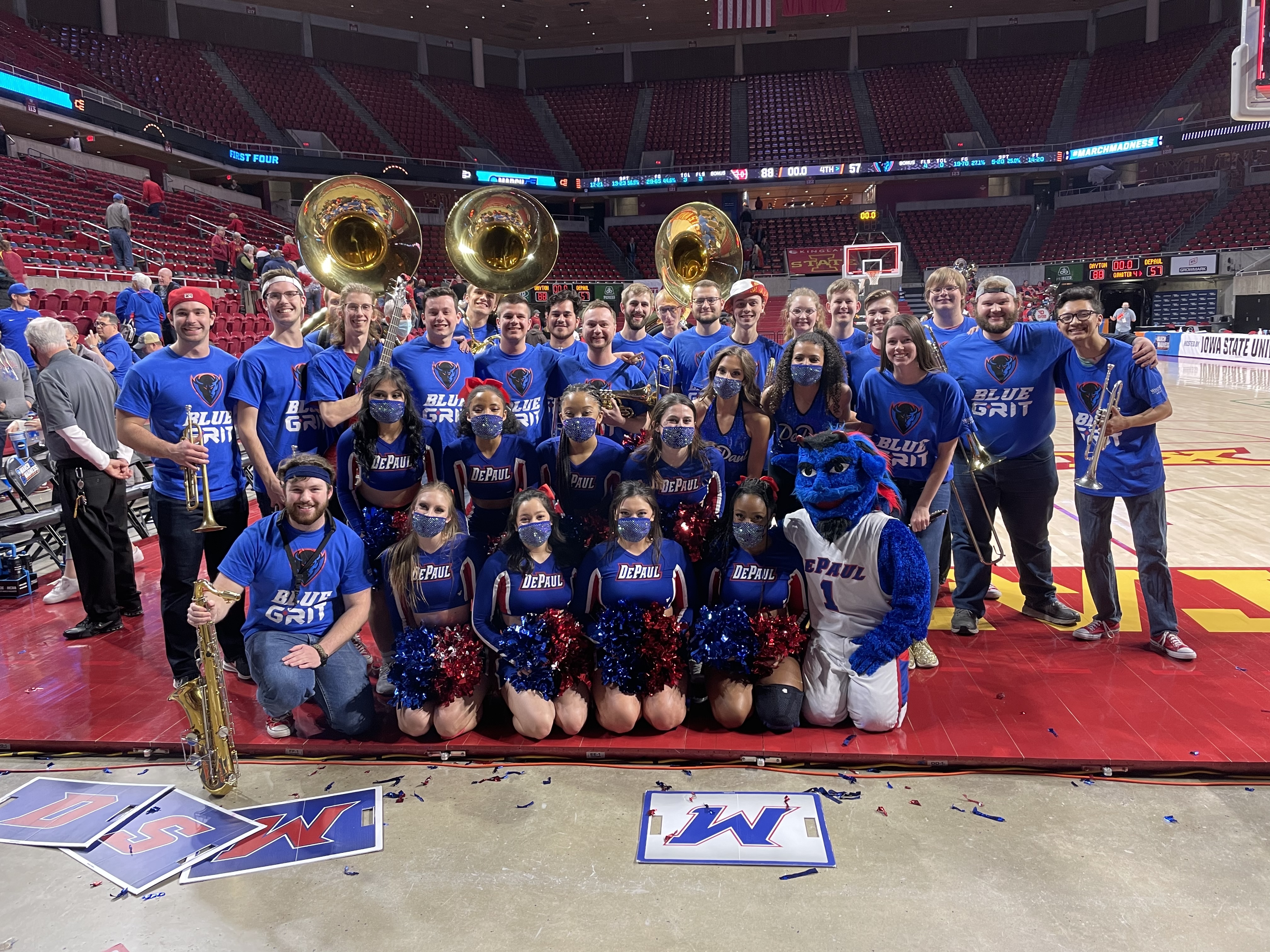
Cyclone pep band members volunteered to serve as the pep band for DePaul at a women's basketball NCAA play-in game March 16 at Hilton Coliseum. Photo courtesy of Christian Carichner.
Star point guard Emily Ryan wasn't the only Cyclone racking up assists last week in Hilton Coliseum, where Iowa State hosted two rounds of NCAA tournament games in women's basketball and a "first four" play-in matchup. Iowa State's pep band also dished up some help.
DePaul faced Dayton in Wednesday's play-in game, slipping into the tournament as one of the final at-large teams. The selection may have surprised DePaul a bit, as many students from the Blue Demons pep band were already off on spring break, said Cyclone Marching Band director Christian Carichner, who also oversees Iowa State's pep bands.
But per NCAA basketball tournament rules, every team is required to have a pep band present at their tournament game. Due to spring break scheduling conflicts, it's not uncommon for schools to struggle to assemble a band as mandated, Carichner said. For instance, at Fiserv Forum in Milwaukee last weekend, where the Cyclone men's team won its first two NCAA games, a group of hired high schoolers were playing the Yale and Colgate fight songs.
"It happens more often than you might think," he said.
DePaul offered to pay Cyclones to stand in for its band, but Carichner said they were happy to help for free. Within about 24 hours of sending out the call, enough ISU band students volunteered to nearly meet the NCAA's 29-member pep band roster cap. It was an honor to pitch in for another program and reinforce the notion that March Madness just doesn't sound right without a boisterous band bracketing the on-court action, he said.
"What they were really doing was representing the importance of bands," he said.
After a crash course in DePaul's fight song, Cyclone band members on Wednesday night donned an unfamiliar color -- blue T-shirts that read "Blue Grit." The Blue Demons lost, but at least they didn't go quietly. If they had managed to win twice to make it to the round of 32 Sunday to play the Cyclones, they were on their own, band-wise -- mostly.
"We probably would have played the DePaul fight song again once or twice," Carichner said.
Schmittmann reappointed as dean of Liberal Arts and Sciences
Beate Schmittmann, dean of the College of Liberal Arts and Sciences (LAS), has been reappointed to a third five-year term.
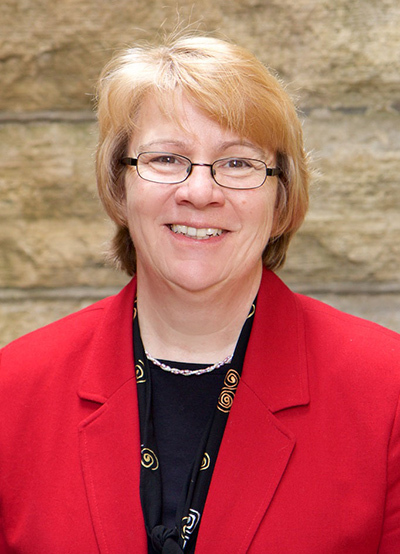
Schmittmann
During her second term, Schmittmann worked with faculty and staff on numerous initiatives to support student-centered learning, including addressing student success in gateway courses; expanding online learning; and supporting the creation of innovative academic programs in areas such as data science and artificial intelligence. The college also renewed its focus on LAS open option students.
"Beate continues to do an outstanding job in managing the needs of a complex college," said senior vice president and provost Jonathan Wickert. "Her strong leadership and transparency are particularly appreciated as she works with faculty and staff to navigate enrollment and fiscal challenges and positions LAS for long-term success."
LAS has 7,300 students, 574 faculty and 270 staff among 21 academic departments, one professional school and 25 cross-disciplinary and interdepartmental programs. The college's faculty and scientific staff attracted nearly $30 million in research grants and contracts in FY2021.
"I am extremely proud of LAS faculty and staff in their efforts to achieve Iowa State's land-grant mission," Schmittmann said. "I look forward to continuing our work to provide students with a high-quality academic experience that prepares them for careers in a diverse, global workplace, and to conduct impactful research that addresses society's challenges."
Wickert expressed thanks to the LAS dean review committee for managing the comprehensive review process. Chad Gasta, professor and chair of the world languages and cultures department, chaired the group, which included:
- Sarah Davis, associate teaching professor, English
- Jennifer Owens, director, LAS student services
- Robert Wallace, associate professor, ecology, evolution and evolutionary biology
- Theresa Windus, Distinguished Professor, chemistry
Wickert also noted his appreciation to faculty and staff in the college who participated in the review process by completing surveys or contacting members of the review committee.
Schmittmann earned a diploma in physics from RWTH Aachen University, Germany, and a Ph.D. from the University of Edinburgh, Scotland. She became LAS dean in 2012 after serving as professor and chair of physics at Virginia Tech University, Blacksburg.
Registration remains open for appreciation week experiences
Staff and faculty jumped at the chance this week to experience corners of campus they might not see in their day-to-day work life -- steam tunnels, the power plant, a yoga studio, to name a few.
Monday's launch of a Faculty and Staff Appreciation Week website is giving non-student employees opportunities to have some fun with their colleagues and experience, at no cost to them, unique pieces of campus life. It also gives Iowa State administrators a different approach to thank employees for their commitment to the university during a two-year pandemic.
Learn more
"We hope you will take part in this celebration of appreciation. Thank you for all that you do to make Iowa State University a very special place," read an emailed invitation signed by President Wendy Wintersteen, senior vice presidents Pam Cain, Jonathan Wickert and Toyia Younger and vice president for university human resources Kristi Darr.
Faculty and Staff Appreciation Week runs March 28-April 1.
As of noon Wednesday, 761 individuals had registered for at least one event. Some experiences, especially those with smaller capacities due to safety or space considerations, filled quickly. Others don't have a cap: Seven days of access to recreation services facilities and programming, an afternoon bowling game (and shoes) at CyBowl in the Memorial Union, Friday disc golf at the Veterinary Medicine campus, a Thursday midday happy hour at the ISU Book Store, a Monday stroll through Reiman Gardens or an ice cream single scoop from the ISU Creamery --with an eligible selfie on your smartphone. You can enjoy guided wellbeing strolls, campus tours and the opening week of the spring Focus Grant exhibition in the MU featuring student works not created for a class. And with a generous cap of 500 people, there's still room for happy hour-goers late Tuesday afternoon in Johnny's at Hilton Coliseum.
Appreciation week organizers encourage people to register by March 25 so hosts know what to expect next week, but the program website and accompanying registration website will remain open through April 1. The registration site notes which programs have filled.
Prior to spring break, senior leaders asked supervisors to permit their employees reasonable participation in appreciation week while still meeting office needs. Nonexempt staff should remain on the clock if they participate in events during their normal work hours.
Study Abroad Center sets up shop in the library
The Study Abroad Center (SAC), which since 2001 has had various homes in the Memorial Union, opened in 281 Parks Library this week. Its new home is that second-floor space you can't help but peer into as you ascend the central staircase at the library.
SAC director Frank Peters said the move is about location and visibility.
"The new space is front and center in one of the most prominent buildings on campus," he said. "In the library, students literally will be walking by us. We hope to capture more drop-in traffic and raise more interest among students for a study-abroad experience."
Studying abroad is among the high-impact practices the university encourages for all undergraduates.
SAC was scheduled to be a fifth-floor tenant following a $10 million renovation of floors 4-6 at the Memorial Union, which is wrapping up this spring. Peters noted the switch makes efficient use of an underutilized space in the library.
Student interactions
University library dean Hilary Seo, who welcomes SAC to her building, said there's synergy in the goals of the library and SAC.
"We both want students to take advantage of our programs and services that will help them gain experiences," she said. "We have great opportunities for them; they just don't know about all of them. I think there's a lot we can do together."
Seo said the focus of a modern library expands beyond its collections to people and services.
"Stop thinking of us as a building full of books. As campus needs evolve, we're redefining what the Iowa State community needs from us -- and it's not always books. We're shifting our focus toward experiences and collaborations that engage students, faculty and staff in fresh ways," she said.
"So it's also about our librarians and library staff and the added value they bring. And it's about dedicating space and technology to support all these interactions," she added.
The library location was important enough that SAC staff -- six when a current vacancy is filled -- will adjust to the smaller footprint. Peters said WorkFlex contracts -- each staff member works remotely one day a week -- and Peters' faculty office in Black Engineering also help alleviate the pinch. The new office in the library features three "check-out" spaces where staff can meet with students and each other.
Peters, who was reappointed this winter to a second three-year, 75% term as SAC director, is the C. G. "Turk" and Joyce A. Therkildsen Professor and associate professor in industrial and manufacturing systems engineering.
In a typical year, about 1,800 Iowa State students study abroad, 1,100 on a faculty-led, college-hosted program lasting one to six weeks. The other 700 students are on semester and longer-term summer programs, about evenly split between SAC and college international study programs. With one exception, there's no duplicative opportunities, so SAC and the college programs collaborate to guide students to the best program for them based on the desired destination and time length.
Multiple support options available during transition to New Quizzes
Preparation and planning were common themes among faculty and support staff during the online panel discussing New Quizzes in Canvas the Center of Excellence in Learning and Teaching (CELT) led on March 22.
Canvas is phasing out Classic Quizzes and replacing it with New Quizzes, which gives instructors more options for question types and is built for accessibility. Instructors can create quizzes in the classic format until June 1, 2023. After that, existing quizzes can only be edited and administered to students. Canvas will sunset Classic Quizzes on June 30, 2024, but instructors can continue migrating quizzes to the new format after that.
New Quizzes will be enabled campuswide on June 1.
When New Quizzes is available, the following courses may benefit from an earlier transition:
-
New courses requiring new content and quiz creation
-
Courses with low-stakes, formative assessment
-
Courses with smaller enrollment and uncomplicated quizzes
-
Courses in which new question types can enhance teaching and learning
Instructors may want to postpone a transition to New Quizzes for some courses, for now, to allow Canvas to continue development and improve functionality. Large enrollment courses using high-stakes, summative quizzes with question content that relies on the rich content editor, uses formulas or third-party tools should consider postponing.
"Since this is a multiyear transition, I would recommend not jumping in with all of your courses all in the same semester," said geological and atmospheric sciences assistant teaching professor Lindsay Maudlin, who is part of a pilot group testing New Quizzes this semester. "Strategically pick a class that has a lower enrollment or a class where the new features may help save you time and ease into it."
Marketing lecturer Susan Fleming emphasized the importance of taking time to test New Quizzes. She also advocated for experimenting and practicing before making the transition.
Instructors will not make the transition alone. Help for instructors is available through CELT virtual open labs on Mondays and Wednesdays (8-10 a.m.), Tuesdays and Thursdays (1-3 p.m.) and Fridays (by appointment).
Demonstrations
During two virtual demonstrations of New Quizzes on April 5 (2-3 p.m.) and April 27 (1-2 p.m.) faculty, staff, graduate students and postdocs can get an overview of New Quizzes.
"We will demonstrate New Quizzes from the student and instructor perspective," CELT instructional specialist Lesya Hassall said. "It is our goal to showcase the capabilities, and help you understand it is best to transition your courses."
CELT will host training sessions for instructors after New Quizzes launches, beginning the week of June 6.
New Quizzes course shell
Instructors can request a course shell, or "sandbox," within Canvas to experiment with New Quizzes before transitioning an actual course.
Classic and New Quizzes share similarities, but the panelists noted the change in interface, moving functions to different places on a user's screen. Trial and error now can help eliminate issues when instructors and students begin using New Quizzes across campus.
After they request a sandbox, instructors automatically are enrolled in a self-paced Canvas course that provides several resources to build and navigate New Quizzes.
Related article:
Canvas making switch to New Quizzes, Feb. 24, 2022
Thinking about a DEI book club? Here's a look at one.
To paraphrase Maya Angelou, you need to know better to do better. That's the ultimate aim for the numerous work teams across campus striving to learn more about diversity, equity and inclusion (DEI) in discussion groups focused on relevant books or films.
In 2020-21, according to the annual diversity and inclusion report from the provost's office, many academic departments held book or multimedia groups for faculty and staff. ISU Extension and Outreach offers a book-based virtual workshop to staff across the state on a regular basis. The College of Veterinary Medicine version is for all employees and students. Materials from past book discussions by ISU library staff are posted online, including proposed schedules, questions and supplemental content.
As part of the faculty and staff preconference portion of the Iowa State Conference on Race and Ethnicity March 2, a group of College of Engineering advisors talked about their experiences in a DEI multimedia club. Here are some highlights of their reflections.
What's the intent?
While working in the registrar's office, Mindy Heggen attended the National Conference on Race and Ethnicity in Higher Education in 2017 and participated in the accompanying professional development academy.
"In academy, we talked a lot about our spheres of influences. What can we do with all the information we were bringing back? We can't just flip a switch and change things. You have to start with your sphere of influence," she said.
That was on her mind when Heggen joined the mechanical engineering advising team in 2018 and noticed there wasn't a facilitated way for advisors to have discussions about ethnicity and race. Those conversations are important for the predominantly white staff of advisors, who often are the university's most consistent one-on-one contact with students, she said.
"The goal of our multimedia club is to improve our cultural awareness and to be comfortable in uncomfortable conversations," she said.
Making the plan
Starting with eight members, the aim for the club was to read two books per semester, with discussion times held during lunch hours. Since then, it's grown to 14 members and selections expanded this year to include films ("The Hate U Give" and "Just Mercy").
Books have included novels ("The Nickel Boys" and "Station Eleven"), memoirs ("Educated"), journalism ("The 1619 Project") and non-fiction ("An Indigenous Peoples' History of the United States" and "White Fragility"). Heggen selects the books and movies, considering group feedback and availability. Local libraries sometimes have book club sets that can be checked out as a group for longer periods of time.
Heggen also acts as facilitator, guided by question prompts she pieces together from various online sources. While the conversation flows naturally based on individual reactions and what's happening in the community, she emphasizes tying it back to their work as advisors.
Asking "What would I do? Who would I get them connected to in the Ames community," is a constant theme in the discussions, said Brad Eilers, an aerospace engineering advisor.
What it's like
Talking about the issues raised in the books and movies can be intense and emotional, making listening to other members' perspectives without judgment essential.
"We know it's a space to learn, so everybody, especially Mindy, makes it very comfortable," said Tina Prouty, an advisor in electrical, computer and cyber security engineering.
But challenging each other's points of view is partially the point, said Ashley Morton, an advisor for undeclared engineering students.
"If I say something that deserves judgment, I want you to call me out on it," Morton said. "I feel like when you're uncomfortable, that's when you're learning. That's why I'm showing up. That's why I'm coming to this. That's a signal of something I need to work on and explore more."
Heggen strikes a balance in part by making it clear that personal statements and opinions shared in the meetings are private.
"As a facilitator, I try to make it a brave space, not a safe space," she said. "The lessons learned follow us, but the stories stay in the room."
Recognizing there are differences in communication style is another key. Heggen said while she's an extrovert who often thinks through something out loud, many other club members need time to internally process a thought before speaking.
"Literally, sometimes I ask a question and count to 20 in my head," she said.
How it helps
Breanna Kixmiller, a mechanical engineering advisor, said the multimedia club has helped her connect with like-minded colleagues and build on what she learned about social justice as she got her master's degree in student affairs. That makes her more attuned to when to speak up as an advocate and when to step back, she said.
Prouty, a history buff, said the readings that examine the past through a different lens have made her more cognizant of misinformation and increasingly empathetic and open to listening.
Morton said her takeaway has been a greater sensitivity about others' backgrounds.
"One lesson I definitely learned is to believe people's stories and understand that their experiences in the world may be very different from mine as a white woman. I try to apply that in conversations with students," she said.
Classroom tents are back through finals week
Perhaps a sign of optimism about a spring dip in COVID-19 cases locally, colleges chose to erect fewer tents for outdoor academic purposes this semester. (Or maybe it's pessimism about the suitability of spring weather for outside studies.) Eight tents were set up during spring break, down from last fall's dozen. They'll remain in place through finals week in May. Once the spring ground firms up, most will be equipped with picnic tables, with the exception of the tent west of Beardshear that will have 100+ folding chairs.
As in the fall, the primary purpose is to support academic gatherings such as classes, study sessions and mentor or advisor meetings. The tent west of Beardshear, hosted by the music and theatre department, primarily will be used for music instruction and rehearsals. Student organizations are welcome to use the tents after 5 p.m. for their gatherings.
The tents project is a provost's office effort to help assure academic continuity during the pandemic and provide outdoor spaces for instructors and students who feel safer working outdoors. The university response team coordinates the tents project.
Academic classrooms: Spring tent inventory
|
Location |
Reservable? |
Reservation contact |
Host |
Furniture |
|
West of Marston (large) |
Yes1 |
Engineering |
picnic tables |
|
|
West of Marston (small) |
Yes1 |
Engineering |
picnic tables |
|
|
West of Beardshear |
Yes2 |
Music and Theatre Dept. |
2 tables, 120 chairs |
|
|
SE of Design |
No* |
|
Design |
picnic tables |
|
South of Armory |
No* |
|
Design |
picnic tables |
|
SW of Gerdin |
Yes3 |
Business |
picnic tables |
|
|
Near Vet Med sand volleyball (2) |
No* |
|
Veterinary Medicine |
picnic tables |
* Available: first come, first served
1 College of Engineering events receive priority
2 MWF (11 a.m.-3:05 p.m.), T Th (12:10-1 p.m.) reserved for choral rehearsals
3 College of Business groups receive priority
Lunchtime performances return at library
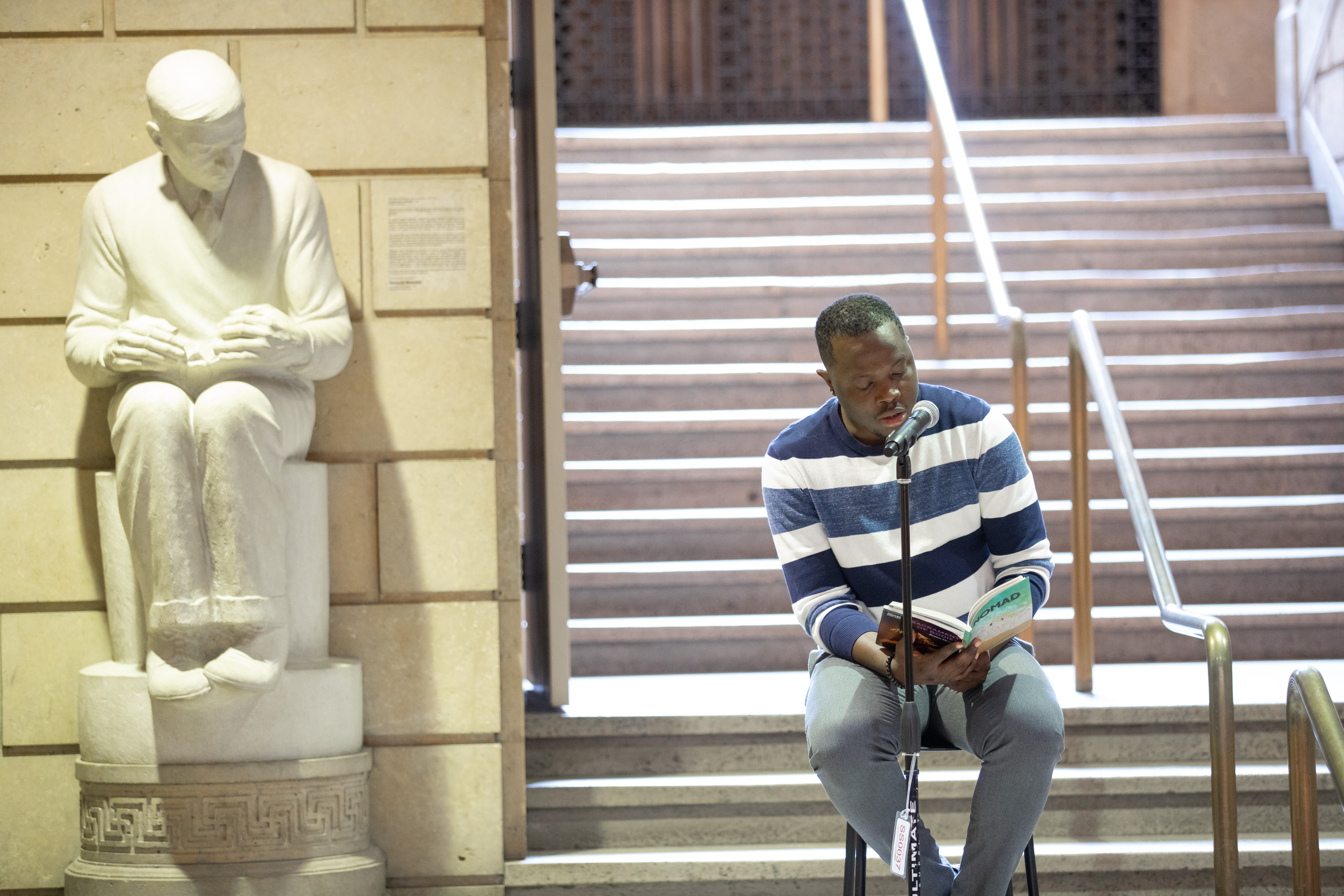
Romeo Oriogun, a postdoctoral research associate in the MFA program in creative writing and environment, reading a selection from his collection of poetry, "Sacrament of Bodies." Oriogun's reading March 21 was the first in a series of Monday Monologues performances at Parks Library this spring. Photo by Christopher Gannon.
Monday Monologues, the lunchtime performance series at Parks Library that highlights campus voices, is back with several events over the next month. This semester's series kicked off Monday with Nigerian poet and essayist, Romeo Oriogun, a postdoctoral research associate in the MFA program in creative writing and environment, reading from "Sacrament of Bodies," a collection of his poetry.
Here are the other events scheduled through the end of April, all beginning at 12:15 p.m. on the library's front steps unless otherwise noted:
-
Selections from BABA, March 28 (in Grant Wood Mural Lobby)
Hear selected songs from a new musical being workshopped and developed at ISU Theatre. BABA is a contemporary, climate-centric musical retelling of Russia’s Baba Yaga fairytale that takes place in familiar-yet-mythic woods of rural America. Full-length performances will take place in Fisher Theater April 7-9 (7:30 p.m.) and April 10 (2 p.m.).   
-
Cantamus, Lyrica and Count Me In, April 4
Gather round and stomp, sing and dance with three ISU choral ensembles performing everything from a Finnish wedding celebration to the Brazilian samba to "Dancing Queen."  
-
ISU Opera Studio, April 11
The ISU Opera Studio presents beloved opera arias and ensembles from their spring program.
-
Stormettes Dance Line, April 25
The Stormettes Dance Line, an ISU student organization open to members with varying levels of experience, promotes team endurance and body positivity by performing a variety of different dance styles, often including majorette, heels and hip-hop.
